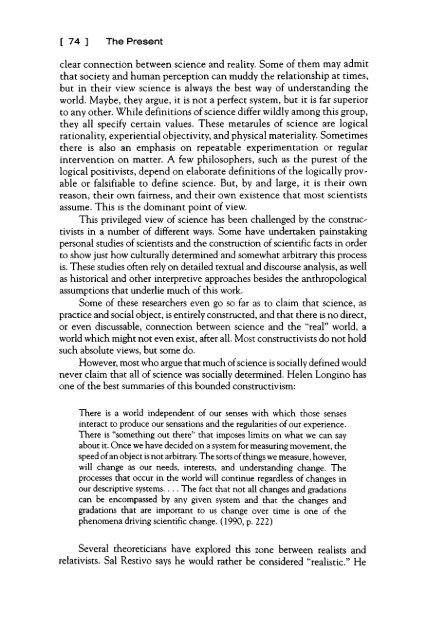entire book - Chris Hables Gray
entire book - Chris Hables Gray
entire book - Chris Hables Gray
You also want an ePaper? Increase the reach of your titles
YUMPU automatically turns print PDFs into web optimized ePapers that Google loves.
[ 74 ] The Present<br />
clear connection between science and reality. Some of them may admit<br />
that society and human perception can muddy the relationship at times,<br />
but in their view science is always the best way of understanding the<br />
world. Maybe, they argue, it is not a perfect system, but it is far superior<br />
to any other. While definitions of science differ wildly among this group,<br />
they all specify certain values. These metarules of science are logical<br />
rationality, experiential objectivity, and physical materiality. Sometimes<br />
there is also an emphasis on repeatable experimentation or regular<br />
intervention on matter. A few philosophers, such as the purest of the<br />
logical positivists, depend on elaborate definitions of the logically provable<br />
or falsifiable to define science. But, by and large, it is their own<br />
reason, their own fairness, and their own existence that most scientists<br />
assume. This is the dominant point of view.<br />
This privileged view of science has been challenged by the construetivists<br />
in a number of different ways. Some have undertaken painstaking<br />
personal studies of scientists and the construction of scientific facts in order<br />
to show just how culturally determined and somewhat arbitrary this process<br />
is. These studies often rely on detailed textual and discourse analysis, as well<br />
as historical and other interpretive approaches besides the anthropological<br />
assumptions that underlie much of this work.<br />
Some of these researchers even go so far as to claim that science, as<br />
practice and social object, is <strong>entire</strong>ly constructed, and that there is no direct,<br />
or even discussable, connection between science and the "real" world, a<br />
world which might not even exist, after all. Most constructivists do not hold<br />
such absolute views, but some do.<br />
However, most who argue that much of science is socially defined would<br />
never claim that all of science was socially determined. Helen Longino has<br />
one of the best summaries of this bounded constructivism:<br />
There is a world independent of our senses with which those senses<br />
interact to produce our sensations and the regularities of our experience.<br />
There is "something out there'' that imposes limits on what we can say<br />
about it. Once we have decided on a system for measuring movement, the<br />
speed of an object is not arbitrary. The sorts of things we measure, however,<br />
will change as our needs, interests, and understanding change. The<br />
processes that occur in the world will continue regardless of changes in<br />
our descriptive systems. . . . The fact that not all changes and gradations<br />
can be encompassed by any given system and that the changes and<br />
gradations that are important to us change over time is one of the<br />
phenomena driving scientific change. (1990, p. 222)<br />
Several theoreticians have explored this zone between realists and<br />
relativists. Sal Restivo says he would rather be considered "realistic." He








